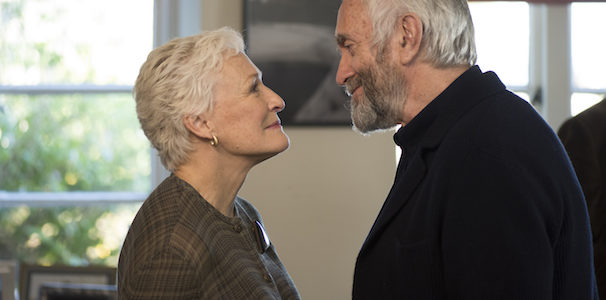
ReelBob: ‘The Wife’ ★★★½
By Bob Bloom
In her long and distinguished career, Glenn Close has never won an Academy Award.
But that can — and should — change after her performance in “The Wife.”
In a career that has spanned more than 40 years and included such movies as “The Big Chill,” “Paradise Road,” “Fatal Attraction,” “Reversal of Fortune,” “Dangerous Liaisons,” “The Natural,” “The World According to Garp” and, yes, “101 Dalmatians,” Close has been nominated for an Oscar six times. If justice and talent win out, then “The Wife” should be her lucky seven.
What is most telling about “The Wife” is its quiet, yet universal, familiarity. The saying, “Behind every great man is a great woman,” has become cliched.
Every successful politician, businessman or other male who has gained fame for work in his field has used the saying in one form or another.
But have you ever considered the truisms of that statement? How many men have wanted to quit or felt rejection, only to be bolstered or encouraged by a wife, partner or some other woman in their lives?
That is basically the premise of “The Wife,” which has been adapted by Jane Anderson from a novel by Meg Wolitzer.
At its core, the movie is an indictment of sexism and the hypocrisy in the literary world, in which men are lionized and women are marginalized.
The movie centers on Joe Castleman (Jonathan Pryce) and his wife, Joan (Close), on the eve of his receiving a phone call telling him he has been awarded the Nobel Prize in Literature.
From the outset, we see Joan as Joe’s caretaker and main cheerleader, easing his doubts about whether he will receive the fateful phone call from Stockholm.
She also monitors his diet and reminds him to take his pills. Joan is his support system.
Yet, from its beginning, you see something in Joan’s eyes. It’s simply a flicker. You are unsure of its significance, but as the movie progresses and their lives together unfold — in the present and in flashback — you come to understand their complex and symbiotic relationship.
Joan keeps Joe grounded, makes sure his ego stays in check and serves as referee between her husband and their son, David, an aspiring writer.
In flashback, we learn how Joe and Joan met in college when he was her literary professor. We see her talent as a writer and discover why she eventually gave it up.
Throughout the movie, director Bjorn Runge drops hints about the couple’s relationship. Joan asks Joe not to mention her in his Nobel acceptance speech because she does not want the spotlight.
She tells Nathaniel Bone (Christian Slater), who wants to write a biography of her husband, that she does not want to be portrayed as a suffering wife or a victim.
“No nugget of bitterness” colors her life, she says.
As the movie progresses, you notice the little sarcastic digs Joan thrusts at Joe.
And when she finally confronts her husband, it burns like fire from a dragon’s breath.
More telling is her comment to the king of Sweden when, at a dinner celebrating the Nobel laureates, he asks her what she does for a living.
“I am a kingmaker,” she replies.
Close’s performance is magnificent; the myriad of emotions she conveys is amazing. She definitely loves her husband, but she also reveals the bitterness and resentment that has festered inside her during their more than 30 years together.
Her every expression and gesture hint at what she has sacrificed for a husband who basks in his celebrity and all the privileges that entails.
When Joan was a student of Joe’s, he told the class, “A writer writes so his soul won’t starve.”
“The Wife” looks at a woman who finally realizes she is tired of digesting crumbs.
I am a member of the Indiana Film Journalists Association. My reviews appear at ReelBob (reelbob.com) and Rottentomatoes (www.rottentomatoes.com). I also review Blu-rays and DVDs. I can be reached by email at bobbloomjc@gmail.com or on Twitter @ReelBobBloom. Links to my reviews can be found on Facebook, Twitter, Google+ and LinkedIn.
THE WIFE
3½ stars out of 4
(R), language, sexual content
